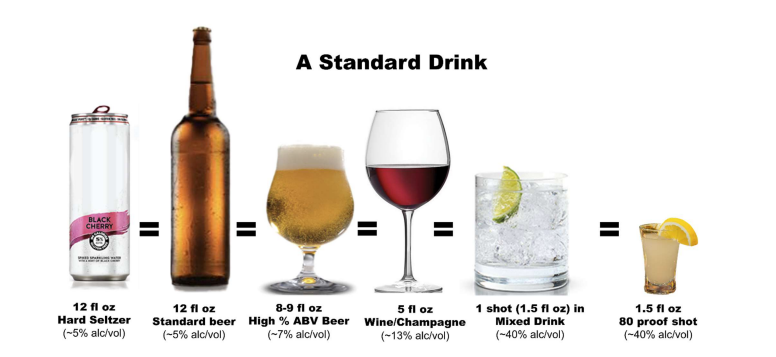Substance Use Information
Alcohol
Standard Drinks
Stick to standard drinks:
Standard Beer |
Bud, Coors, Montucky, etc. | 12 oz | |
Microbrew, Malt Liquor, Cider |
IPAs, Strong Bow, Colt 45, micros | 8-9 oz | |
Hard Selzers |
White Claws, Smirnoff, etc. | 12 oz | |
Wine |
Red, white | 5 oz | |
Hard alcohol |
Rum, Tequila, Voda, Whisky, etc. | 1.5 oz (1 shot) |
Our body can only process about 1 drink per hour, but that can vary based upon body size, gender, how much we've eaten that day, how hydrated we are, and what medications we're on.
Tips to Party Smart
There are only two ways to ensure we lessen the risks and physical effects of alcohol: Only drink about 1 standard drink per hour, or don't drink. If you do drink, follow some of these tips for health and safety:
Avoid: |
|
Instead: |
|
Rapid drinking (shots, drinking games). |
Stick to about one drink per hour. Drink slowly. Play games without drinking. Fake a drink. Fill your glass or cup with water. | ||
Pressuring others to drink. |
Support friends making their own choices; people have many reasons they may not want to drink. About 62% of MSU students didn't drink in the last 2 weeks. |
||
Feeling pressured to drink. |
Say: I'm not drinking tonight; I'm driving; it's a busy week for me; I'm on medications that don't mix with alcohol; I'm good thanks; I'll still play, I just don't want to drink. |
||
Unmeasured drinks. |
Use a shot glass when making mixed drinks. Ask servers how much alcohol is in craft cocktails. Watch your server make your drink. A red solo cup is 16 oz, so about 3/4 of a solo cup is approximately 12oz. If you aren't using standard measures, over-estimate how much you're actually drinking. | ||
Drinking on an empty stomach. |
Have food before, during, and after drinking. If you're the host, serve non-salty food and snacks. | ||
Dehydration. |
Drink water before and in between alcoholic drinks. |
||
Driving under the influence. |
Call an Uber or Lyft; call a friend; arrange a ride first; call Cat Cab at 406-994-7571.
|
||
Risk of injury or death. |
Don't over drink. If someone is passed out, non-responsive, vomiting, has a weak pulse or shallow breathing, is pale, cold or clammy, or has any form of injury, PUT THEM IN A RECOVERY POSITION AND CALL 911. MSU has a medical amnesty policy so those who are under-age, intoxicated, etc., will not be penalized when getting emergency medical assistance. | ||
Risk of suicide. |
Avoid or minimize alcohol or drug use if you're having a mental health challenge, drinking to manage distress, or you feel sad, depressed, or suicidal. Call or text 988 for help for yourself or a friend, or call 911. |
Safe Rides
MSU offers safe rides through Cat Cab.
Signs of an Alcohol Problem
According to the National Institute on Alcohol Abuse and Alcoholism, signs of problematic alcohol use include:
Losing control of your drinking. |
Drinking more or longer than intended; unsuccessful attempts to stop or minimize drinking. | |
Preoccupation with drinking, time spent drinking or recovering. |
Frequent drinking/partying; time planning to party; craving alcohol; hangovers or long recovery; skipping or quitting other activities to drink; stealing money or alcohol in order to drink. |
|
Continued use despite negative consequences. |
Drinking despite legal or disciplinary problems; continued use despite health or mental health symptoms/against provider advice; partying despite poor academic performance; friends or family concerned about or hurt by drinking. | |
Life interference due to use or recovery. |
Missing classes or assignments to party or because of hangovers; lying about drinking neglecting relationships, family, friends, work, etc. |
|
High risk situations. |
Driving drunk; acting dangerously or impulsively; aggression; fighting; feeling suicidal or depressed when drinking; blacking out. |
|
Tolerance. |
Needing more to get an effect; not being effected from usual amount. |
|
Withdrawal. |
Symptoms when not drinking or recovering from drinking: shaking, nausea, anxeity, irritability, racing heart, difficulty sleeping; hallucinations; seizures. |
Mental Health America provides a free online addictions screening, and MSU suscribes to an free online mental health screening.
Where to Get Help
MSU Students can get free counseling, medical care, and referrals at Counseling and Psychological Services and Student Health Services. Campus Recreation and the Office of Student Engagement offer a variety of substance-free events.
Off campus, Rimrock offers treatment, education, and support.

